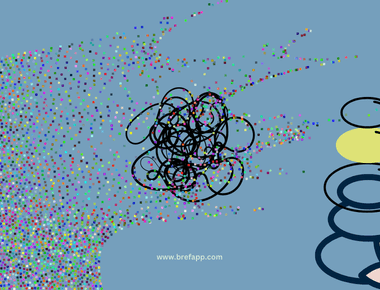
Predictably Irrational: The Hidden Forces That Shape Our Decisions

“Predictably Irrational: The Hidden Forces That Shape Our Decisions” is a book written by Dan Ariely, a renowned behavioral economist and professor at Duke University. The book explores the concept of irrational decision-making and how our behavior is influenced by hidden psychological factors.
Ariely argues that contrary to what we believe, human decision-making is not always rational and that we are often influenced by our emotions, biases, and social norms. Through a series of experiments and real-life examples, Ariely reveals the hidden forces that affect our decision-making and shape our behavior.
Part 1: The Truth about Relativity
In the first section of “Predictably Irrational,” Dan Ariely explores how humans make decisions based on comparisons, and how this relativity can be influenced by hidden forces. He introduces key concepts such as the decoy effect, anchoring, relativity, and framing to explain how these hidden forces can affect our decision-making.
The decoy effect refers to the phenomenon where the introduction of a third, less attractive option can influence our decision-making by making one of the other options more appealing. For example, Ariely presents a study in which participants were asked to choose between two different subscription options for The Economist magazine. When a third, more expensive option was added, participants were more likely to choose the more expensive option that was originally presented as the middle option, indicating that the presence of the decoy option influenced their decision.
Anchoring refers to the idea that our perception of value can be influenced by an initial reference point, or anchor. For example, when participants were asked to estimate the percentage of African countries in the United Nations, those who were first asked if the percentage was higher or lower than 65% gave higher estimates than those who were first asked if the percentage was higher or lower than 10%.
Relativity refers to the idea that our perception of value is not absolute, but rather is influenced by the context in which options are presented. For example, Ariely presents a study in which participants were asked to choose between two different types of chocolates. When the chocolates were presented individually, participants were evenly split between the two types. However, when the chocolates were presented side-by-side, participants overwhelmingly chose the slightly inferior chocolate.
Framing refers to the way in which options are presented, and how this can influence our decision-making. For example, when a product is presented as having a small chance of failure, we are more likely to choose it than when it is presented as having a high chance of success. Ariely also presents a study in which participants were asked to choose between two different types of beer, one of which was free. When the beer was presented as free, participants overwhelmingly chose it, even when it was of lower quality than the other option.
“ Ariely argues that these hidden forces of relativity can significantly influence our decision-making, and that we are not always as rational as we think.”
Part 2: The Fallacy of Supply and Demand
In the second section of “Predictably Irrational,” Dan Ariely challenges the traditional economic model of supply and demand, which assumes that people make rational decisions based solely on their self-interest. He introduces key concepts such as market norms vs. social norms, the effect of expectations, and the power of incentives to explain how our decisions can be influenced by factors beyond supply and demand.
Market norms are the traditional economic principles that drive supply and demand, where everything has a price and people make decisions based on self-interest. Social norms, on the other hand, are more about the intrinsic value of relationships and social connections. Ariely argues that our decision-making can be influenced by both types of norms, and that these norms can sometimes conflict with each other.
The effect of expectations refers to the idea that our perceptions of value are influenced by what we expect to happen. For example, in a study of a daycare center, Ariely found that introducing a fine for parents who picked up their children late actually increased the number of late pickups, because parents began to view the service as a market transaction rather than a social one.
The power of incentives refers to the idea that incentives can have both positive and negative effects on behavior. For example, Ariely presents a study in which participants were given a task to complete, and were offered either a small monetary reward or a large monetary reward for completing it. Interestingly, those offered the larger reward actually performed worse than those offered the smaller reward, because the large reward increased the pressure to perform well.
Ariely also presents an experiment with free beer, which illustrates how the traditional economic model of supply and demand can be challenged. In the experiment, participants were given either one free beer or two free beers, and were then offered the opportunity to purchase additional beers at a reduced price. Those who were given two free beers actually purchased fewer additional beers than those who were given only one free beer, because they felt that they had already received enough value.
“ Ariely argues that our decisions are not solely based on supply and demand, but are influenced by a variety of factors such as social norms, expectations, and incentives. By understanding these hidden forces, we can make better decisions and navigate the complexities of our economic and social lives.”
Part 3: The Cost of Social Norms
In the third section of “Predictably Irrational,” Dan Ariely examines how social norms can lead us to make irrational decisions, and how these decisions can have real costs for us as individuals and as a society. He introduces key concepts such as reciprocity, trust, and fairness to explain how our decisions are influenced by our social connections and our sense of fairness.
Reciprocity refers to the idea that people tend to repay favors or gifts, even when there is no expectation of a return. Ariely presents a study in which participants were given Hershey’s Kisses by a stranger, and then later asked to purchase raffle tickets from the same stranger. Participants who had received more Hershey’s Kisses tended to purchase more raffle tickets, even though there was no logical connection between the two actions.
Trust is another important social norm that can influence our decisions. Ariely presents a study in which participants were asked to play a game in which they could either cooperate or defect, and then were told that their partner had either defected or cooperated. Interestingly, participants who believed that their partner had cooperated were more likely to cooperate themselves, even when there was no rational reason to do so.
Fairness is also a key concept in social norms, and Ariely presents an example of the Ultimatum Game to illustrate this. In the game, one participant is given a sum of money and must offer a portion of it to the other participant. The other participant can then accept or reject the offer, but if they reject it, neither participant receives any money. Surprisingly, many participants choose to reject offers that they perceive as unfair, even when this means that they receive nothing.
Ariely argues that our adherence to social norms can sometimes lead us to make irrational decisions, and that this can have real costs for us as individuals and as a society. For example, our tendency to trust and cooperate with others can be exploited by those who seek to defraud us, and our sense of fairness can sometimes lead us to reject offers that would be beneficial for us.
“ Ariely’s third section highlights the importance of understanding the role of social norms in our decision-making, and the potential costs and benefits that come with following these norms. By being aware of these hidden forces, we can make better decisions and build stronger social connections.”
Part 4: The Influence of Arousal
In the fourth section of “Predictably Irrational,” Dan Ariely examines how emotions can affect our decision-making. He introduces key concepts such as the pain of paying, the power of expectations, and the effect of arousal to explain how our emotional states can influence our choices.
The pain of paying refers to the discomfort we feel when we part with our money. Ariely presents a study in which participants were asked to bid on items in an online auction, and found that those who used a credit card (rather than cash) were willing to bid higher amounts. This suggests that the pain of paying is lower when we use a credit card, which can lead us to make more impulsive purchases.
The power of expectations is another key concept in emotional decision-making. Ariely presents a study in which participants were given a placebo painkiller and then asked to rate their pain levels. Those who were told that the painkiller was expensive reported feeling less pain, even though the pill itself was just a sugar pill. This suggests that our expectations can have a powerful effect on our perceptions and experiences.
Arousal is also an important factor in emotional decision-making, as it can affect our ability to think rationally. Ariely presents a study in which participants were asked to rate the attractiveness of various individuals, and found that those who were aroused (by watching an erotic movie) tended to rate the people as more attractive than those who were not aroused. This suggests that our emotional state can influence how we perceive the world around us, and can lead us to make different decisions than we would if we were in a different state.
Ariely argues that understanding how emotions can affect our decision-making is important because it can help us make better choices. By being aware of the pain of paying, the power of expectations, and the effect of arousal, we can make decisions that align with our long-term goals and values, rather than being swayed by our emotional states in the moment.
” Ariely’s fourth section highlights the importance of recognizing the role of emotions in our decision-making, and the potential risks and benefits that come with being aware of them. By paying attention to our emotional states and how they affect our choices, we can make more informed and intentional decisions.”
FinalThoughts
In “Predictably Irrational,” Dan Ariely challenges the traditional economic model of human decision-making, arguing that our choices are not as rational as we often think. Throughout the book, Ariely presents a range of studies and experiments that illustrate how various psychological and social factors can influence our decision-making, from the power of relativity and social norms, to the impact of emotions and expectations.
Overall, Ariely’s main thesis is that understanding these hidden forces is critical for making better decisions in our personal and professional lives. By recognizing our own irrational tendencies and the ways in which others can manipulate our decision-making, we can become more intentional and deliberate in our choices.
The implications of this insight are far-reaching, with implications for everything from personal finance and consumer behavior to politics and social justice. By recognizing the ways in which our decisions are shaped by social norms, for example, we can better understand the dynamics of power and privilege in society, and work to challenge systems that perpetuate inequality.
For readers who want to gain a better understanding of these hidden forces, “Predictably Irrational” is an engaging and accessible read that presents a range of compelling examples and insights. Whether you’re interested in improving your own decision-making or understanding the broader implications of these findings for society, Ariely’s book offers valuable food for thought.
Tags
Related Posts




Quick Links
Categories


